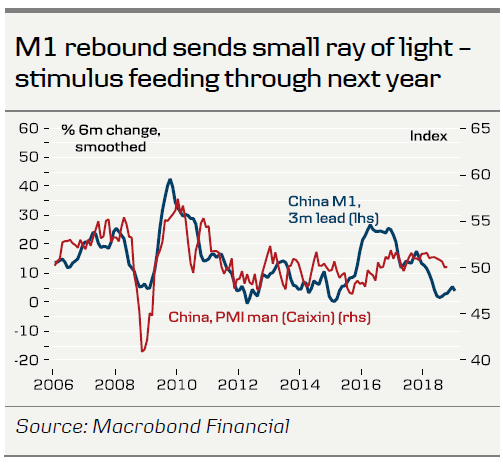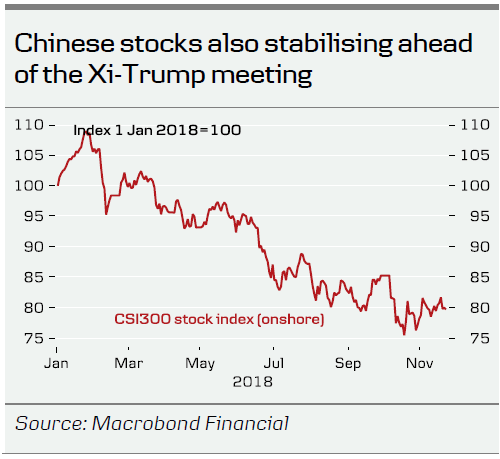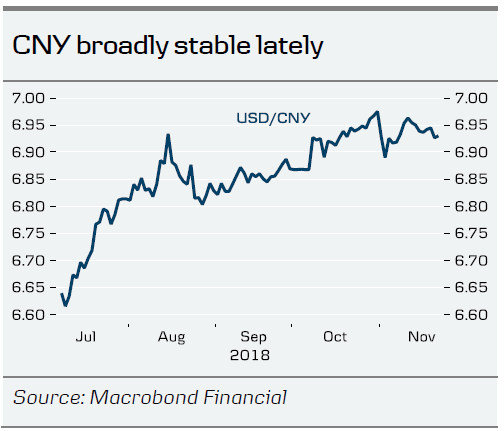- Cautious optimism ahead of the Xi-Trump meeting
- APEC meeting underlines long-term US-China rivalry
- Chinese economy gets worse before it gets better
Cautious optimism ahead of the Xi-Trump meeting
All eyes are on the Xi-Trump meeting at the G20 and the tone is more positive on the US side than we have seen for some time. At a press conference on Thursday Donald Trump stated that ‘I have been preparing for it all my life… I know every ingredient, every stat. I know it better than anyone knows it… My gut is always right’. He also again hailed his great relationship with Xi Jinping, see Channel Newsasia.
During the week Trump’s economic adviser Larry Kudlow added to the positive sentiment saying that ‘As we move toward the G20 meeting, communications, very detailed communications are occurring at all levels of government…I think that’s a much better place than where we were two, three, four weeks ago’, see Politico.
It is not all hunky-dory, though. A new report by US Trade Representative Robert Lighthizer provides an update on China’s theft of Intellectual Property Rights (IPR). The conclusion is very clear: ‘This update shows that China has not fundamentally altered its unfair, unreasonable, and market-distorting practices that were the subject of the March 2018 report on our Section 301 investigation’. China has denied the accusations, calling them ‘groundless’ and ‘unacceptable’, see People’s Daily.
Other news on the meeting: SCMP reported this week that the ultra-hawk on China, Peter Navarro (author of ‘Death by China’), will not attend the dinner. Navarro has previously been in open quarrel with US Treasury Secretary Stephen Mnuchin and last week Larry Kudlow said Navarro had been ‘way off base’ referring to comments by Navarro who referred to global billionaires as ‘unregistered foreign agents’ because they tried to pressure Trump into making a deal.
Comment. While there are clearly still big outstanding issues between the US and China, we still see a 60% chance of a ceasefire at the meeting, even if it may not go as smoothly as Trump seems to expect. Both Xi and Trump are taking a risk by going into direct talks for the first time and neither of them can afford a failure. Trump has taken the initiative and branded himself as the guy who could fix the problems with China. Hence a failure would damage this image. Similarly, Xi Jinping could lose face domestically if the meeting ends with no result and China ends up facing more tariffs next year. We will publish a preview of the meeting early next week with more details on why we look for a ceasefire.
US-China clash at APEC meeting – is Mike Pence the ‘bad cop’?
The rising rivalry between the US and China became evident again at the annual APEC meeting last weekend, see SCMP. The meeting ended without a joint communiqué for the first time in its 29-year history and China’s President Xi Jinping and US Vice President Mike Pence targeted each other with very tough words in their respective speeches.
Xi stated that ‘history has shown that confrontation, whether in the form of a cold war, a hot war or a trade war, produces no winners’ and that ‘Unilateralism and protectionism will not solve problems but add uncertainty to the world economy’.
Pence, in turn, said that ‘We have great respect for President Xi and China, but as we all know, China has taken advantage of the United States for many, many years and those days are over’. He also blasted China for the Belt and Road Initiative and stated ‘know that the US offers a better option…We don’t drown our partners in a sea of debt, we don’t coerce, or compromise your independence … We don’t offer a constricting belt or a one way road.’
Comment. Mike Pence’s speech follows a similar very tough speech in early October at which he aimed numerous verbal shots at China – a speech that some commentators have seen as marking the beginning of a cold war between the US and China. It contrasts with the more positive tone by Trump recently, which gives the impression of a ‘good cop – bad cop’ division between Trump and Pence currently. Either way, we believe the rivalry is here to stay. And although we expect a trade deal in 2019, the outlook of China surpassing the US economically by 2030 – and likely becoming twice as big by 2050 – sets the stage for more tensions and strategic competition for many years to come.
Economic outlook – it gets worse before it gets better
There were no Chinese key figures released this week, but we used the pause to update our China Leading Indicators chart pack. It’s a mixed picture but overall the indicators suggest more weakness short term, but recovery from Q2 as stimulus kicks in, see China Leading Indicators – It gets worse before it gets better, 21 November 2018. In financial markets this week, the CNY and Chinese equities were again trading broadly sideways as market participants await the Xi-Trump meeting next week.
Other China news this week:
EU agrees on investment screening while China calls it ‘self-harm’. To end what a negotiator called ‘European naivety’, the EU on Tuesday agreed on far reaching rules to screen foreign investments, see Reuters. The deal aims to protect strategic investments in the area of infrastructure and technology. A China Daily Editorial calls the restrictions ‘self-harming’ and states that it ‘will put a brake on the momentum of Chinese investment in the EU, which does not bode well for their strategic partnership’.
China and Russia look to ditch USD with new payments system. They are drafting a pact to increase the use of their own currencies in bilateral and international trade, see SCMP.
Dolce & Gabbana has felt the wrath of Chinese consumers. In a video, the two founders of the Italian fashion company asked for forgiveness after Chinese consumers launched a boycott of their products. A commercial seen as racist against Chinese people, which was then followed by Gabbana describing China as a ‘country of s***’ triggered the anger, see Reuters.
Box: The APEC cooperation
What is APEC?
The Asia-Pacific Economic Cooperation (APEC) is a regional economic forum established in 1989 to leverage the growing interdependence of the Asia-Pacific. The leaders of the APEC countries meet annually in one of the APEC countries. This year Papua New Guinea hosted the meeting.
APEC’s 21 members aim to create greater prosperity for the people of the region by promoting balanced, inclusive, sustainable, innovative and secure growth and by accelerating regional economic integration.
Its members are countries along the pacific rim and include China, the US, Russia, Japan, Canada, Australia, Indonesia, Malaysia, Vietnam, Mexico and Peru.
What does APEC do?
APEC ensures that goods, services, investment and people move easily across borders.
Members facilitate this trade through faster customs procedures at borders; more favourable business climates behind the border; and aligning regulations and standards across the region”
Source: APEC web page



